From laboratory spaces to clinical settings and even in villages as far away as Nairobi, Kenya, Case Western Reserve University’s many women in science are breaking boundaries in their fields.
But their efforts aren’t only revolutionizing such feats as how we store energy, treat water sources or ensure children stay safe from lead exposure—they’re inspiring the next generation of women in science to forge their own paths.
This dynamic takes center stage each year as the United Nations recognizes International Day of Women and Girls in Science (Feb. 11), a day meant to help combat the gender gap that persists in science and promote equal access for women.
In celebration of the day,The Daily spoke with just a few of the trailblazing women who are leading and working in science at CWRU—from settings in medicine, chemistry and engineering to social science and the law.
Desiree Mae Prado
Third-year chemistry doctoral student
College of Arts and Sciences
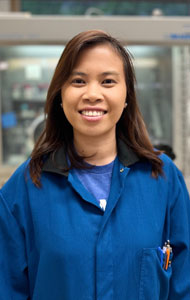
Moving the world away from a reliance on fossil fuels and toward renewable energy is no small undertaking, especially as experiencing unprecedented climate change unfolds. Fortunately, there are young scientists with passions for electrochemistry and energy storage dedicated to the cause—including third-year chemistry doctoral student Desiree Mae Prado.
“There are challenges for integrating renewable resources into the existing power systems,” Prado said. “It’s imperative that we develop and implement robust storage systems capable of capturing and discharging stored energy, thereby ensuring grid stability and reliability.”
Working out of Clemens Burda’s lab, Prado is part of a larger interdisciplinary collaborative taking part in a $10.75 million grant from the U.S. Department of Energy. Led by Case School of Engineering’s Robert Savinell, “The Breakthrough Electrolytes for Energy Storage and Systems” project also includes partnerships with other esteemed universities, including The Ohio State University and New York University.
“My research focuses on developing structured electrolytes for large-scale and long-term energy storage—such as flow batteries—with the aim of efficiently storing energy from intermittent solar and wind sources,” Prado said.
Inspired by her mother who instilled a belief that women should not be limited by societal expectations, Prado recognizes the importance of championing women considering careers in STEM-related fields.
“There remains significant barriers women need to break in these fields,” she said. “By fostering a culture of women supporting women, we can actively work towards dismantling gender biases and creating a more inclusive environment.”
“I feel incredibly fortunate to be doing what I truly enjoy,” Prado concluded.
Shu Tu
Third-year Doctor of Dental Medicine student
School of Dental Medicine
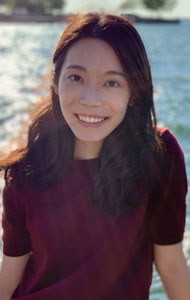
“The water flows without contention, but vies for being endless and unceasing.”
This Chinese idiom has always been third-year Doctor of Dental Medicine student Shu Tu’s motto for work and for life.
“Science has no end,” said Tu. “It’s never about competition. Instead, persistence is the key to success.”
Science may not be about competition in Tu’s eyes, but her achievements tell a different story. In 2022, Tu was recognized with the top prize at the Student Competition Advancing Dental Research and Its Application (SCADA) awards—and had the privilege of representing the School of Dental Medicine at the American Association for Dental, Oral and Craniofacial Research (AADOCR) conference in March of 2023.
Tu was also recognized while working on her bachelor’s degree at the University of Liverpool—she received a fully funded research intern position through the United Kingdom National Health Service Research funding program.
“At that time, I was the only woman among the five participants enrolled in this scholarship,” Tu shared. “That experience introduced scientific research into my life and encouraged me to be curious.”
As she continues to explore different biomedical research fields, Tu is very glad to have encountered more and more women participating in these different research programs.
“My advice for women who wish to succeed in STEM is to believe in yourself, to be highly collaborative with colleagues and to persevere—especially at times when nothing seems to be working,” said Tu. “Strive to be persistent in pursuing your goals without distraction, just as the water in a stream flows smoothly and endlessly without interruption.”
Bridget Hegarty
Assistant professor, Department of Civil and Environmental Engineering
Case School of Engineering
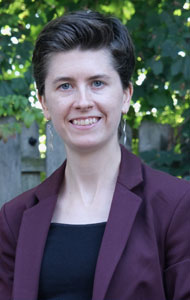
A strong sense of curiosity led Bridget Hegarty to a career in STEM and now, years later, she still has the same love for asking questions—and finding the answers—as she did when she was a child.
After attending a high school camp that encouraged women and minorities to pursue engineering, her fate was sealed. What she didn’t know then is that she’d end up with a master’s degree, a PhD and a career in academia.
Well into her graduate school studies, Hegarty’s questions hadn’t stopped and she was captivated by her research at the intersection of biology and environmental engineering. Plus, she was intrigued by how higher education institutions functioned and, in particular, the diversity initiatives that enabled them to flourish.
Hegarty started reading literature around gender biases, spent hours volunteering for K-12 outreach programs and founded a section of the Society for Women Engineers (she is now the graduate advisor for the CWRU section).
“I thought… Ok, I want to become a member of the faculty because I will either stay in the research track where the questions don’t stop,” she said, “or it will give me the opportunity to shape institutions in ways involving [diversity, equity and inclusion].”
While making discoveries on microbes in the built environment and water treatment processes, Hegarty remains committed to improving the gender gap in engineering.
“Often we hope and want things to change all at once and it feels like they should be able to,” she said. “Unfortunately it doesn’t work that way, but small things can add up and when you see those small changes work it gives you the patience to keep trying.”
Sharona Hoffman
Edgar A. Hahn Professor of Jurisprudence, professor of bioethics and co-director of the CWRU Law-Medicine Center
School of Law
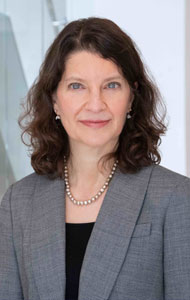
Law professor Sharona Hoffman’s interests in disability and aging only intensified after her husband’s Parkinson’s disease diagnosis in 2013.
“The fields of law and medicine are inextricably intertwined,” she said. “You cannot operate a healthcare practice or manage any part of the healthcare industry without mastery of the relevant laws and regulations.”
Hoffman, now the Edgar A. Hahn Professor of Jurisprudence, professor of bioethics and co-director of the CWRU Law-Medicine Center, focuses on the intersection of law and medicine. Before joining the CWRU faculty in 1999, Hoffman was a senior trial attorney at the Equal Employment Opportunity Commission where she litigated many discrimination cases, including age and disability claims. This work inspired much of her scholarship.
A prolific author, Hoffman has written extensively about the legal implications of health information technology, big data and artificial intelligence in medicine. She often co-authors with her husband, Andy Podgurski, a professor of computer and data sciences at Case School of Engineering.
“We have had a lot of fun working together,” says Hoffman, “and we are fortunate to be able to combine our expertise to produce cutting-edge scholarship.” Hoffman also has a great interest in cognitive decline, having written about the legal aspects of it in the workplace, in medical practice and in operating motor vehicles. She particularly enjoys sharing her knowledge with the general public through frequent talks in the community and a book titled, Aging with a Plan: How a Little Thought Today Can Vastly Improve Your Tomorrow. Hoffman will be hosting a national conference on cognitive decline and the law this spring.
Sonia Minnes
Verna Houck Motto Professor of Social Work
Jack, Joseph and Morton Mandel School of Applied Social Sciences
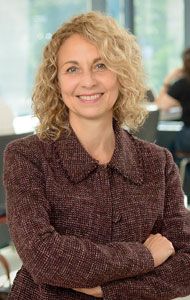
With a determined focus on the long-term well-being of children, Sonia Minnes is dedicated to bridging the gap between research and actionable strategies in preventing lead poisoning. As the Verna Houck Motto Professor of Social Work and research director at the Schubert Center for Child Studies, Minnes is working to eliminate this critical impediment to child development through her work with the Lead Safe Cleveland Coalition’s Educational Intervention Subcommittee.
The group works toward aligning research findings with practical policy measures and recently developed recommendations for the Cleveland Metropolitan School District to address elevated lead levels and their educational impact. They also petitioned the Department of Developmental Disabilities to change the elevated blood lead levels eligibility requirement from 3.5 to 5 micrograms per deciliter so children with levels in that range receive treatment for any health impacts, and the exposure sources are mitigated.
Minnes’ research has always focused on children—the majority of her academic articles are related to the developmental effects of prenatal cocaine/polydrug exposure. An important part of her work is evaluating environmental factors that either interact with or independently play a role in behavioral and cognitive outcomes in children.
Throughout her career, Minnes has been fortunate to have had mentors teach her about the science of prenatal drug exposure and the importance of the environment in the development of young children.
“I feel very lucky to have had such successful role models and women colleagues show me the way,” she reflected.
Grace McComsey
Vice Dean for Clinical and Translational Research
School of Medicine
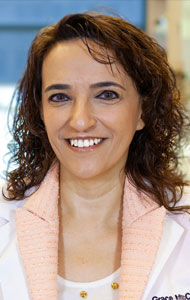
As a world-renowned HIV researcher and infectious disease clinician, Grace McComsey, vice dean for clinical and translational research at the School of Medicine, has dedicated her career to unraveling the mysteries of disease through scientific research aimed at improving health outcomes and making people’s lives better.
“With thousands of diseases and only hundreds of treatments, there is an urgency for research breakthroughs to reach patients and communities,” McComsey shared. “When I think about research, it is about giving hope to those without available therapies to treat their disease.”
McComsey, director of the Clinical and Translational Science Collaborative (CTSC) of Northern Ohio, leads the center’s efforts with a laser focus to bring medical discoveries from bench to bedside—translating scientific discoveries into real health solutions. Last August, McComsey’s efforts in leading the renewal of the CTSC grant resulted in the largest single award in the university’s history, $56.3 million.
Encouraged by her parents to become a physician, McComsey’s path to medicine was shaped by her experiences as a medical student and Red Cross volunteer in the late 1980s during the Lebanese Civil War. After arriving in the United States as a recent medical school graduate—and not knowing any English—she was eager to learn and set her sights on a career in infectious disease because of its focus on the patient, not a specific organ or system.
Closing the gap between lab discoveries and patient care has been at the core of McComsey’s research efforts, which include tackling some of the most challenging health emergencies—HIV and COVID-19. She leads one of the 14 hubs for the National Institute of Health’s (NIH) Researching COVID to Enhance Recovery (RECOVER) Initiative and has served as the principal investigator on 15 HIV-related NIH grants to transform global understanding of the disease.
Monica Wagner
Assistant Professor
Frances Payne Bolton School of Nursing
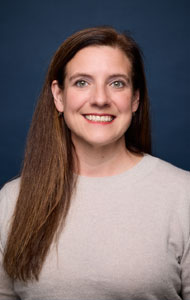
Monica Wagner’s work at Frances Payne Bolton School of Nursing lives at the crossroads of nursing and biological sciences.
While nurses often focus solely on clinical practice, Wagner’s approach is supported by scientific research, bridging the gap between disciplines often divided by gender roles and what defines nursing research.
After college, Wagner taught primary school, then transitioned to teaching biology and chemistry at a community college where she decided to pursue another degree, this time in nursing. She was interested in learning more about preventative care from a scientific perspective.
“I spent my ‘bedside’ nursing career in critical care as it was the perfect intersection between biology, chemistry and nursing,” she said. “Then I decided to earn a PhD to use my background in the sciences to build my nursing research program.”
Wagner’s research seeks to address one of the biggest problems nurses face: pain management. An expert on how chronic pain manifests at a molecular level in cancer survivors, Wagner now uses clinical, demographic and biological data to develop models for predicting a patient’s risk for developing cancer-related pain.
As a nurse scientist, Wagner said she was often limited to what nurses should do based on gender roles, biases in the scientific community, and those questioning whether her work was even nursing. Her advice for other women is to not let others define your profession or research for you.
“When people question whether my research is nursing or biology, I say nursing involves anything that has to do with improving the health experience at any level,” Wagner said. “Depending on what you want to address, sometimes you need to start at the basic, biological level, and then follow where the investigation leads you.”
Sedona Jolly
Fourth-year student majoring in economics
Weatherhead School of Management
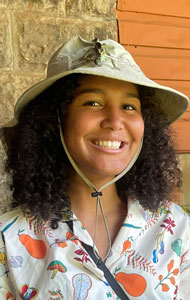
Sedona Jolly’s interest in climate action was ignited when she read Braiding Sweetgrass by Robin Wall Kimmerer and listened to an episode of the Ologies podcast with Dr. Suzanne Pierre about critical ecology.
“I stopped seeing the climate and environment as something ‘out there’ and more as something that we are all a part of,” Jolly said.
As a fourth-year economics major, this inspired Jolly’s capstone on rights of nature laws, which grant legal rights to natural entities.
“I found a positive effect of rights of nature laws on local air quality—a proxy for public health—but wasn’t convinced by the results,” Jolly said. “My senior year has been dedicated to learning about the relationship between humans and the natural world from a variety of perspectives.”
This semester, Jolly is studying in Nairobi, Kenya, at the Turkana Basin Institute as part of a field-based program on ecology, geology, archeology, anthropology and human evolution.
“Understanding climate here is essential because it was what allowed our species to evolve in the first place,” Jolly said. “We didn’t arrive here in a vacuum—we evolved alongside elephants, locusts, grasses, diseases and the climate of the savanna—which is now rapidly changing.”
After graduation, Jolly will be working with professors as a research assistant at the University of Chicago. The focus of their work is consumption inequality and the ways consumption varies with wealth from month to month.
“I hope to learn more about economic research to be better prepared for PhD programs,” Jolly said. “And I want to think more critically about financial institutions and their role in inequality and the climate crisis.”
